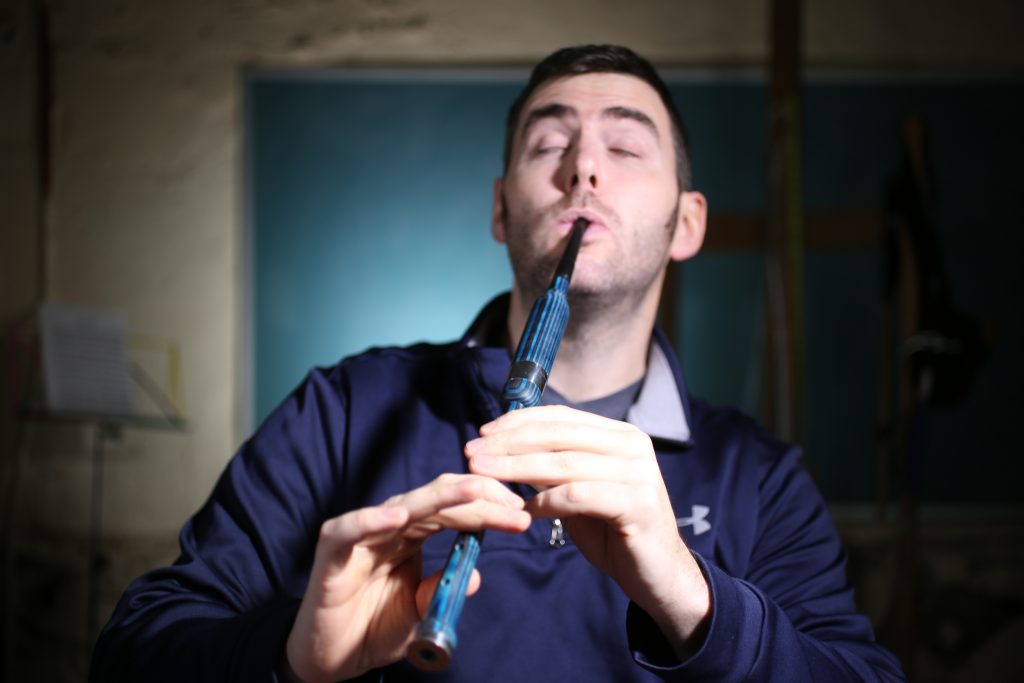David McDougall: No Longer "Adequate"

My dad was the pipe major in a Canadian Army Reserve Band in the late 50s and early 60s.
Knowing what he had done in the past planted a seed with me when I was young, but it was only after we lost him that I realized I wanted to do it too. I could have learned from him when I was young, but being a stupid kid, I didn't see value of the opportunity right in front of me.
He passed away in 1993 and I inherited his pipes. It took me til the age of 41 to finally realize that if I didn't start now, I never would. So I sought out an instructor and got lessons.
Initially I just wanted to be able to play a few tunes for my family in honour of my dad. I wasn't looking to join a band, but a friend of mine was the drum major in a local reserve band and encouraged (well, more like forced) me to come play with them.
Playing in a military band with people much better than you is a real challenge. In trying to keep up with them, I developed a lot of bad habits. I never really learned to tune myself because it was always done for me. Learning new tunes fully embellished from the start was difficult as well. That being said, I still really enjoyed the experience.
Because I had started this whole journey later in life, I was satisfied that I would never be a good player, I had become comfortable describing myself as "adequate".
After I retired and moved away, my instruction came to an end. As it happens, someone forwarded me an email about this online piping school called Dojo. It was interesting, but I wasn't ready to jump in, I had other priorities having just relocated. I had talked about it with some other members of the new band I had joined here and heard good things. I subscribed to their email newsletter and one day they advertised this tuning clinic going on in Troy. I mean, who doesn't struggle with tuning?
So I and another bandmate decided to try it out. It was a very useful experience, nobody had ever explained the blow trick to me or anyone else I knew. Who knew it could be that simple?
Fast forward 2 or 3 years, just passing over the peak of COVID, we lost our pipe major (not like that – he didn't actually succumb to the virus, he just stepped down). We muddled on for months, different members stepping up to lead practices, it wasn't a big deal because we weren't performing in public.
As things improved, we had jobs coming down the pipeline, and the band started looking in earnest for someone to take the reins. Not something I wanted to do, but it looked like nobody else would do it either so I said I would.
Talk about panic ensuing! I was nowhere near qualified for that role. I decided I had better do something to prepare, so I finally bit the bullet and joined Dojo. That was probably the smartest thing I could have done, although karma stepped in and I didn't have to take over the band.
Been a Dojo member now for seven months. There was a fairly lengthy period of time (probably 4 or 5 years) between my initial exposure to the Dojo and actually signing up for membership. In the meantime, I had done the tuning clinic, gone on a Dojo cruise, and purchased several online courses. I guess I thought "why pay the ongoing membership fees when I could buy bits at a time?" Boy, was I wrong.
It wasn't until I started doing all the stuff in the challenges and phase progression that I came to realize that there was no reason for me to remain stuck as an "adequate" piper. There is just so much stuff the Dojo exposes you to that you can't get anywhere else, even with private lessons. The community itself is very encouraging, never judgmental and has a positive atmosphere while still being able to show you what you need to focus on. Where else can you meet and talk to pipers from all over the world several times a week?
In the short time that I have been an actual member, I have noticed that my piping is much better. In particular, doing the rhythm course had the greatest impact on my playing. I am convinced that this one course should be mandatory for every piper since rhythm (or lack of it) affects practically every aspect of playing the pipes.
My pipes are easier to play, sound better, and when something doesn't sound quite right or I have difficulty, I know what to look at to fix it. Tuning is much more effortless. I am playing stuff I would have just flipped the page on before. The Tune of The Week program shows you that no matter how hard that tune looks on paper, you can still play it, and we do.
My embellishments are cleaner and more even, and scale navigation has improved. Playing right on the beat and expression are way better.
I am more confident now when I play and don't hide my sound among the other pipers in the band. Not nearly so nervous when playing in public.
David McDougall, New Brunswick, Canada





